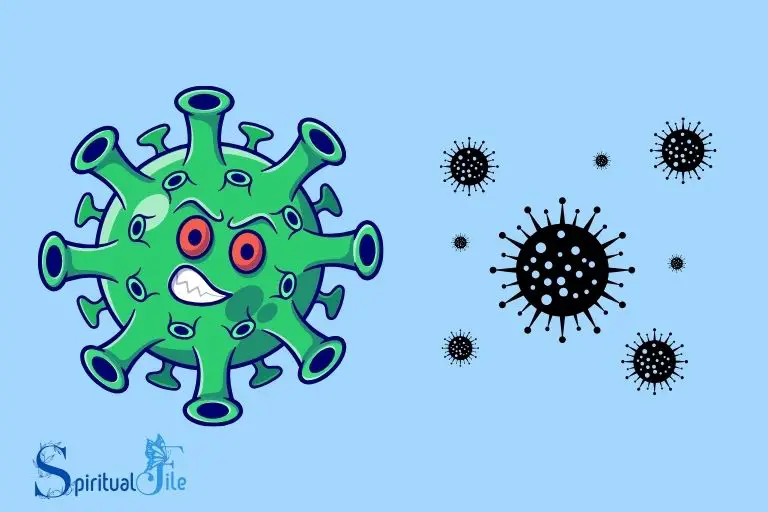Examples of Spiritual Diseases: Emotional!
Spiritual diseases are disturbances in the human spirit that can lead to physical, emotional, and mental distress if left unattended. Examples of spiritual diseases include fear, anger, resentment, unforgiveness, and pride.
Spiritual diseases are often a result of unresolved emotional issues or trauma, that affect our spirit or inner being. This might include feelings of resentment, anger, fear, pride, and unforgiveness.
These conditions can cause us to feel disconnected from our true selves, others, and the world around us. If left untreated, spiritual diseases can manifest in various ways, including physical illness, emotional distress, and mental health problems.

Key Takeaway
9 Spiritual Diseases Examples
| Spiritual Disease | Description |
|---|---|
| Pride | Excessive self-confidence or arrogance, forgetting about one’s own limitations, and denying the power of God. |
| Envy | Resentment or sadness at the good fortune of others, and the inability to feel happiness for other people’s accomplishments. |
| Wrath/Anger | Extreme fury or rage that may lead to violent words or actions. It also disturbs inner peace. |
| Avarice/Greed | Desire for wealth or material possessions more than any spiritual growth. It makes a person selfish and unkind. |
| Sloth | Lack of effort in performing one’s duties or responsibilities, especially spiritual ones. |
| Lust | Uncontrolled desire for physical pleasure, particularly sexual, which may lead to obsession and away from spiritual peace. |
| Gluttony | Overindulgence in food or drink, neglecting one’s physical and spiritual health. |
| Despair | Losing hope in God’s grace and mercy. Results in spiritual unrest. |
| Doubt | Constant uncertainty about one’s faith or God’s truths. It can hinder spiritual growth. |
Understanding Spiritual Diseases
Spiritual diseases, rooted in religious and philosophical traditions, disrupt an individual’s inner or spiritual well-being.
Unlike physical or mental illnesses impacting the body or mind, they affect the soul or inner essence. This article explores their definition, origins, and distinctions from physical and mental ailments.
Defining Spiritual Diseases:
Spiritual diseases are imbalances in a person’s spiritual life, impacting morality, ethics, values, and purpose.
They manifest as greed, envy, hatred, pride, or spiritual emptiness, hindering spiritual growth and causing a disconnect from the higher self, a higher power, or the universe.
Origins of Spiritual Diseases:
The origins of spiritual diseases are diverse and can be traced to a combination of external factors and internal predispositions.
Some common factors that contribute to the development of spiritual diseases include:
Environmental Influences: The society, culture, and upbringing of an individual can significantly impact their spiritual well-being. Negative influences or a lack of moral guidance can foster the growth of spiritual diseases.
Personal Choices: Spiritual diseases often result from choices individuals make in their lives. Engaging in unethical behavior, pursuing materialism at the expense of spiritual growth, or harboring negative emotions can all contribute to the development of spiritual diseases.
Lack of Self-Awareness: Ignorance of one’s inner self, values, and beliefs can make it difficult to recognize and address spiritual diseases. Self-reflection and introspection are key to understanding and combating these afflictions.
Differences from Physical and Mental Illnesses:
Spiritual diseases are distinct from physical and mental illnesses in several ways:
Nature: Physical illnesses primarily affect the body, resulting in physiological dysfunction, while mental illnesses predominantly impact a person’s cognitive and emotional faculties. Spiritual diseases, on the other hand, focus on the inner, spiritual dimension of an individual.
Diagnosis and Treatment: Physical and mental illnesses are often diagnosed through medical or psychological assessments and treated using medical interventions or therapy.
In contrast, spiritual diseases are typically diagnosed through introspection and self-awareness. Their treatment involves spiritual practices, ethical adjustments, and personal growth.
Observable Symptoms: Physical and mental illnesses often exhibit observable symptoms, such as pain, fever, or changes in behavior.
Spiritual diseases, being internal and abstract, may not display outward signs but can manifest in an individual’s thoughts, emotions, and actions.
Scope: Physical and mental illnesses can be present in individuals regardless of their spiritual beliefs or practices. Spiritual diseases, on the other hand, are intertwined with an individual’s spirituality and moral compass.
The Symptoms Of Spiritual Diseases
Spiritual diseases can manifest through various symptoms, such as excessive materialism, egoistic behavior, spiritual ignorance, lack of empathy, and attachment to worldly desires.
These examples highlight the detrimental effects of spiritual ailments on our overall well-being and inner growth.
Detachment From Purpose And Higher Meaning:
Feeling lost and disconnected from a sense of purpose in life can be a symptom of a spiritual disease.
This detachment may manifest in different ways, such as:
- Lack of clarity about one’s passions and goals: Without a sense of purpose, individuals may struggle to identify what truly drives them.
- Sense of emptiness and meaninglessness: This feeling of emptiness can result from a disconnect from higher meaning and spiritual nourishment.
- Lack of motivation and inspiration: When one’s purpose and connection to higher meaning are absent, it can lead to a lack of drive and inspiration in life.
- Inability to find joy and fulfillment: Without being aligned with one’s purpose and higher meaning, it can be challenging to experience genuine fulfillment and joy.
Discontentment And Lack Of Fulfillment:
A spiritual disease can often manifest as a constant feeling of discontentment and a lack of fulfillment in life.
Some common symptoms may include:
- Persistent dissatisfaction: Individuals may feel that something is missing or that their lives lack true satisfaction and contentment.
- Inability to appreciate the present moment: Focusing too much on what is lacking rather than embracing the present moment can contribute to a sense of discontentment.
- Perpetual comparison to others: Constantly comparing oneself to others can lead to feelings of inadequacy and dissatisfaction with one’s own life and accomplishments.
- Pursuit of external validation: Seeking validation and approval from others rather than finding fulfillment within can be a sign of spiritual disease.
Unhealthy Attachment To Worldly Possessions:
An unhealthy attachment to worldly possessions can also indicate a spiritual disease.
This attachment may manifest in the following ways:
- Materialistic mindset: Placing excessive importance on the accumulation and ownership of material possessions can lead to a distorted prioritization of value.
- Obsession with acquiring more: Constantly striving to obtain more possessions, often beyond what is necessary or reasonable, can be a symptom of spiritual disease.
- Inability to let go: Holding on tightly to possessions, whether physical or emotional, can hinder personal growth and spiritual development.
- Identification with possessions: Viewing possessions as an integral part of one’s identity can indicate an unhealthy attachment to worldly goods.
Remember, recognizing and addressing these symptoms is crucial for spiritual growth and well-being.
By cultivating a sense of purpose, finding contentment within, and detaching from the material world, we can overcome spiritual diseases and experience greater fulfillment in life.
Types Of Spiritual Diseases
Spiritual diseases can manifest in various forms, such as arrogance, envy, greed, and anger. These negative emotions and vices hinder personal growth and spiritual well-being.
Negativity And Pessimism: The Silent Killers
Negativity and pessimism can have a detrimental impact on our spiritual well-being.
Here are some ways in which these spiritual diseases manifest:
- Attitude of defeatism: Constantly expecting the worst outcomes can create a self-fulfilling prophecy, hindering personal growth and success.
- Lack of gratitude: Focusing on what is lacking rather than appreciating what we have can lead to dissatisfaction and unhappiness.
- Toxic self-talk: Negative self-talk can erode self-esteem and prevent us from realizing our full potential.
- Resisting change: A pessimistic mindset often resists change, keeping us stuck in unfulfilling situations.
- Diminishing others: Negativity can lead to judgment and comparison, diminishing the value and worth of others.
Materialism: The Covetous Mind
Materialism is a spiritual disease that stems from an excessive desire for material possessions and attachments.
Here are some characteristics of a covetous mind:
- Obsession with wealth and possessions: A preoccupation with acquiring more and more material things can lead to dissatisfaction and neglect of our spiritual well-being.
- Emphasis on external validation: Materialism often places a high value on wealth and status as a measure of success, leading to a constant need for approval from others.
- Attachment to possessions: Clinging to material possessions can create a sense of dependency and prevent us from finding true fulfillment.
- Ignoring inner growth: Materialistic pursuits can consume our time and energy, leaving little room for personal and spiritual development.
- Disregarding the needs of others: Prioritizing material acquisitions can result in disregarding the needs of others, leading to a lack of empathy and compassion.
Ego: The Enemy Within
The ego plays a significant role in spiritual diseases.
Here’s how ego manifests and affects our spiritual well-being:
- Sense of superiority: The ego often thrives on the belief that we are superior to others, fueling arrogance and a lack of humility.
- Resistance to feedback: An inflated ego can make it difficult to accept criticism or feedback, hindering personal growth and improvement.
- Need for control: The ego seeks control over situations and people, leading to stress, anxiety, and a sense of powerlessness when control is challenged.
- Separation and division: The ego reinforces the illusion of separateness, creating division and conflict among individuals.
- Inauthenticity: Ego-driven behavior often leads to a lack of authenticity, as we strive to present ourselves in ways that feed our self-image.
Remember, recognizing these spiritual diseases is the first step towards healing and cultivating a more fulfilling spiritual life. By addressing these negative influences, we can embark on a journey of growth, self-discovery, and inner harmony.
FAQ About Examples Of Spiritual Diseases
What Are Spiritual Diseases?
Spiritual diseases refer to ailments that affect the well-being of a person’s spiritual or inner self. These conditions can include negative emotions, such as fear, anger, and resentment, as well as a lack of purpose or connection.
Spiritual diseases can manifest as a sense of emptiness, confusion, or detachment from one’s deeper purpose in life.
They often arise from a disconnection with one’s values, beliefs, and deeper spiritual nature. Healing these diseases involves taking steps towards self-awareness, self-reflection, and nurturing one’s spiritual growth.
This may involve practices such as meditation, prayer, gratitude, forgiveness, and self-care.
Recognizing and addressing spiritual diseases is crucial for attaining a sense of fulfillment, inner peace, and alignment with one’s true self.
What Are The Symptoms Of Spiritual Sickness?
Symptoms of spiritual sickness include loss of purpose, deep emptiness, and feelings of disconnectedness. You may experience a lack of inner peace, constant negativity, and a decrease in motivation.
Physical symptoms such as fatigue, insomnia, and changes in appetite can also manifest.
Difficulty in making decisions, frequent mood swings, and a preoccupation with material possessions are common signs.
It is not uncommon to isolate oneself from social interactions and experience a loss of interest in previously enjoyed activities.
Additionally, engaging in self-destructive behaviors like excessive drinking or drug abuse may indicate spiritual sickness.
If you notice these symptoms, seeking spiritual guidance and actively engaging in practices that promote self-reflection and emotional well-being is essential.
What Are Examples Of Spiritual Pain?
Spiritual pain can manifest in various forms, such as feeling alienated from one’s sense of purpose or experiencing a profound loss of hope. It can also arise from a lack of meaning in life or struggling with existential questions.
Another example is a deep sense of guilt or shame, stemming from moral or ethical conflicts.
Some individuals may experience spiritual pain while going through a spiritual crisis or grappling with a loss of faith or belief system.
Others may feel disconnected from their inner selves, leading to feelings of emptiness or loneliness. The grieving process and the search for forgiveness or reconciliation can also contribute to spiritual pain.
It’s important to acknowledge and address these forms of distress as part of overall well-being.
What Are The Different Types Of Spiritual Distress?
Spiritual distress can manifest in various ways, such as existential crisis, loss of faith, or moral conflicts. It encompasses individuals feeling disconnected, questioning their beliefs, or struggling to find meaning and purpose in life.
Existential crisis is when someone faces uncertainty about life’s meaning and struggles with existence.
Loss of faith refers to a loss of trust or confidence in one’s religious or spiritual beliefs.
Moral conflicts arise when a person is torn between their personal values and the expectations of their faith tradition. These different types of spiritual distress can cause feelings of anxiety, despair, or inner turmoil.
It is important to address and support individuals experiencing spiritual distress to promote their overall well-being and help them find solace and peace.
What Are The Common Spiritual Diseases?
Common spiritual diseases include envy, pride, greed, anger, and lust, which hinder spiritual growth.
Conclusion
In Conclusion, spiritual diseases profoundly affect our well-being and growth. This blog explored examples like pride, greed, envy, and resentment.
Awareness and effort are vital for personal growth, leading to qualities like humility, contentment, compassion, and forgiveness.
Spiritual healing is ongoing, requiring self-reflection and mindfulness. Let’s purify our souls, nurture our hearts, and live a fulfilling, enlightened life, overcoming these diseases to become better individuals.






